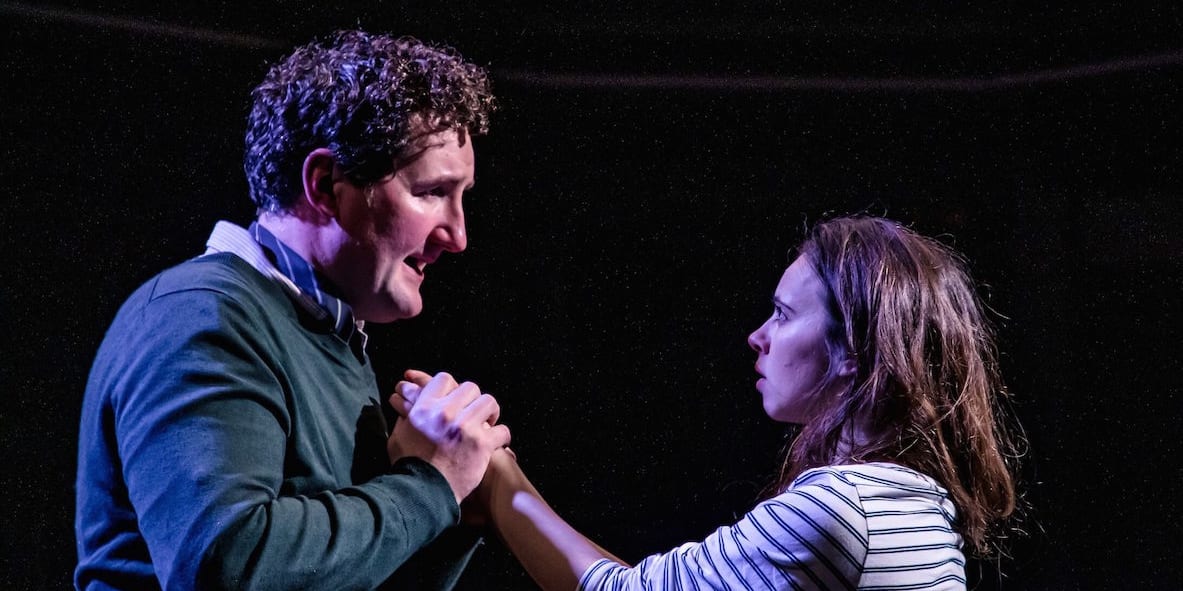This production is a revival of Lucy Prebble’s debut play from 2003. For those who only know her work through the grandly ambitious themes of ‘Enron’ and ‘A Very Expensive Poison’, this more intimate play will be a surprise. The fascination with computer technology and its implications for our social and emotional lives is already present, but so is an intense, detailed focus on teenage angst, family relationships and the boundaries of experiment and taboo, that you would not expect from her later work.
The title of the play refers to the way people during World War Two would spend food coupons on a swift sugar-hit rather than saving them up for items offering more nutritious and rewarding satisfaction. The play asks, essentially, if that is what we all fundamentally are, and whether access to online gratifications, especially sexual ones, is created or simply revealed by its ready availability.
The movement of the plot is quite limited, but the series of situations created are both moving and disturbing, often reducing the press-night audience to a rare stillness of concentration and self-reflection. At the centre of it all is, Dani, (Jessica Rhodes) a troubled bulimic teenager, who is alienated from her absentee father and wanly ineffectual mother (Alexandra Gilbreath), and dissatisfied with the connection she makes online and in real life with a fellow teen (Ali Barouti). Instead, she gravitates towards Tim, a cultured, posh but damaged paedophile (John Hollingworth), whom she originally met through a predictable online gendered misunderstanding.
The performances are mostly magnificent, especially the radiantly expressive and distressed Rhodes, for whom this is astonishingly her first professional appearance after graduation. Dani’s curiosity, recklessness, warmth and mixture of sophistication and innocence come across in an expertly graded characterisation that does full justice to the wit and pathos of Prebble’s writing. She is matched by the sensitivity, darkly-defeated charm of Hollingworth in an obviously ungrateful role. He manages to indicate how empathy and a deep understanding of human nature can coexist alongside unsubdued and unacceptable urges: neither fully monster nor misunderstood victim. It is a tribute to both writer and actor that we find complexity here in an area where usually there is only stridency. It is no less troubling for that, and perhaps more so in fact.
Ali Barouti has less to do as the baffled and ultimately rejected teenager, Lewis. It is always a challenge for an actor to inhabit a character who is basically inarticulate and angry with a world he can neither understand nor make an impact upon; but we get to feel his frustration and hidden violence forcibly alongside his genuine concern for Dani’s welfare. He and Rhodes also deserve great technical credit for an excruciatingly awkward and credibly fumbled sex scene. Only Alexandra Gilbreath seems somewhat underpowered in the role of Dani’s mother, Jan. In several key scenes with Rhodes, both the writing and the acting seem more conventional and predictable and the energy sags a little. The lack of comprehension between mother and daughter, and an older and a younger woman is less well realised than the oddball connection between Dani and Tim.
As usual at the Orange Tree theatre, production values are excellent: the limitations of space and the unforgiving fact that this is theatre in the round stimulate director and designer to effects that combine minimalism with close attention to detail. The set is simply a polished black floor with a sunken recess for interior space (so well disguised that a stage manager had to be on hand to stop audience members falling into it!). Shabby props clutter it to indicate Tim’s temporary accommodation, and swings descend economically to indicate a playground exterior. A particular coup is the use of strip lighting on different levels to suggest internet activity, albeit of an archaic kind – the screech of a dial-up modem seemed to provoke an almost nostalgic sigh from older punters!
This is a very satisfying revival, another vindication of this theatre’s mission to recover plays of different periods that deserve another and a closer look. Author and performers deserve great credit for bringing such rich characters to life so fully, for treating difficult themes unflinchingly and finding humour in areas where you would be least likely to suspect it.

